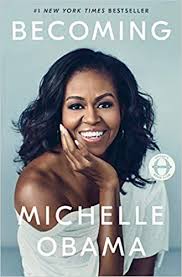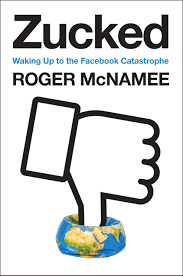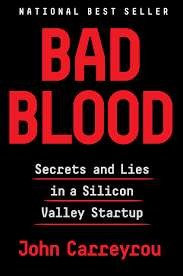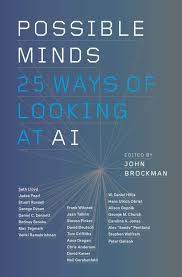Previous Years
COMPLETED (short summaries below)
“Becoming” by Michelle Obama
rating: 3 stars
“The Jungle and the Debate Over Federal Meat Inspection” – a case study from the book “Democracy” by David Moss
rating: N/A
“Zucked” by Robert McNamee
rating: 2 stars
“Bad Blood” by John Carreyrou
rating: 1 star
“1493: Uncovering the New World Columbus Created” by Charles Mann
rating: 1 star
“Possible Minds: 25 Way of Looking at AI” – a collection of essays curated by John Brockman
rating: 2 stars
“Super Pumped: The Battle for Uber” by Mike Issac
rating: 1 star
Overview and next year goal
Like last year, I read six books again this year. Unlike last year, this year’s books weren’t filled with 3 star ratings, but that’s ok, because the books I read were still enjoyable. I guess thematically, I read a fair amount about Silicon Valley technology and companies. Maybe this was subconsciously related to my move to the Bay Area?
Since I started keeping track here in 2016, I’ve read 29 books/publications, broken down as follows:
-Eight “3 stars” (Becoming , Origin Story, The Radical King, Letter From Birmingham Jail, Born A Crime, Astrophysics For People In A Hurry, Sapiens, American Lion)
-Five “2 stars” (Possible Minds, Zucked, Subliminal, The Immortal Life of Henrietta Lacks, Midnight’s Fury)
– Eleven “1 stars” (Super Pumped, Bad Blood, 1493, The Jungle and the Debate Over Federal Meat Inspection, Everybody Lies, The Sports Gene, What Happened, What The Dog Saw, Shoe Dog, The Wright Brothers, The Gene)
-Five “N/A stars” (John Tyler, Artemis, William Henry Harrison, Thinking Fast And Slow, Martin Van Buren)
Here’s to a good 2020!
IN PROGRESS
“Polk: The Man Who Transformed the Presidency and America” By Walter R. Borneman (still)
“The Adventure of Huckleberry Finn” by Mark Twain
“Narrative Economics: How Stories Go Viral and Drive Major Economic Events” by Robert Shiller
“How to Change Your Mind” By Michael Pollan
SHORT SUMMARIES
Becoming – By Michelle Obama
Rating: 3 stars
SHORT SUMMARY (272 words or less):
I’ve been on a streak of three star books, and this one is no exception. Instead of summarizing the book, I’ll summarize my takeaways.
Michelle Obama provides an honest and deeply reflective view of her journey, how she became who she is, and how she is still becoming who she hopes to be. In these extraordinary times, it’s an important and inspiring memoir to read. Not just for the grandeur symbolism of American optimism (rising from the south side of Chicago to the White House), but also for its relatability in the successes, set backs, fun, sorrow, and just plain living, that Obama recounts in her life. It’s refreshing to hear her life story told with such authenticity and groundedness.
One of the themes in this book that I enjoyed was the idea of “swerving.” How your life plan may take you one way or another, and sometimes that can largely be influenced by upbringing or personal philosophies, but every now and then, you can take a swerve. It could be deliberate, it could be accidental. Obama describes this concept early and often in her book: a college boyfriend who “swerved” from his medical school path to pursue becoming a pro-football mascot; her brother who left his corporate career to coach basketball; her career change from a big law firm to public service. At the end of the book, she recognizes that her biggest swerve came the day she went on a date with Barack, and how two people born with different backgrounds and innate influences complimented each other, supported each other, and had faith, but no guarantees, in their future together.
The Jungle and the Debate Over Federal Meat Packing – Case Study by David Moss
Rating: N/A
SHORT SUMMARY (272 words or less)
As lame as reading a case study on the 19th and early 20th century meat industry might be, I found this fascinating. The case study discusses oligopolies and price fixing that affected not just the meat industry but also the railroad industry. Basically, the railroads consolidated into four large companies (The Big Four), and they were exerting price fixing strains on customers. The meat industry benefited–as larger companies were able to extract more favorable rail rates. Congress intervened to bust the railroad trust with the Interstate Commerce Act, but it took a long time to have teeth.
The meat industry was notorious for its terrible sanitation and work conditions, but Congress was impotent to act against them, due to the meat lobby. Ultimately a book called “The Jungle” by Upton Sinclair as well as advocacy by progressive-era journalists called muckrakers turned public perception toward reform. Teddy Rosevelt signed into law the Meat Inspection Act of 1906–and the case study focuses on the legislative negotiations during this process. My biggest takeaway, however, was somewhat unrelated but it gave me hope. Railroad trusts and meat industry collusion had been around since around the 1870s, but it took almost 40 years for regulation and reform to come fully to those industries. It makes me hopeful for the times today–that issues may take a long time to resolve, perhaps past our lifetimes, so you have to do what you can during your life to push the needle that way. Also, how the power of culture (in this case a book by Sinclair) can change public perception.
Zucked – By Robert McNamee
Rating: 2 stars
SHORT SUMMARY (272 words or less)
This book is packed with a lot of information. It starts by discussing the history of tech startups in Silicon Valley and moves to a commentary on Facebook’s economic incentive systems. The author’s main thesis is that Facebook should be regulated as a monopolistic platform. The argument is partly based in historical economic and legal jurisprudence and partly based on corporate morality. McNamee, an early FB investor, believes that FB’s economic incentives, namely user engagement and online advertising, encourage keeping users on site and using psychological tricks to do so. That’s not really new, advertisers have been doing that forever. The author’s argument is more rooted in the size and scale of impact that Facebook has, and that FB is essentially being used for social manipulation by anyone who can pay the right price. McNamee talks about his views on how FB affected major geopolitical events–the 2016 US Presidential Election, the Brexit Vote, and the genocide against Rohingya Muslims in Myanmar. His view is that FB and other platforms create filter bubbles for their users and echo chambers reenforced through exploitation of base human psychology. Bad actors use these tools to create false narratives and opportunities for outside entities to influence large numbers of people through misinformation. For McNamee, the combination of these pitfalls and FB’s vast reach and ostensible operation as a publishing platform lend itself to regulation.
It raises compelling anti-trust questions. I don’t know where I fall on it, but I think at the very least, it would be interesting to see how existing anti-trust frameworks (and historical precedent) could be adapted to evaluate monopoly power in silicon valley.
Bad Blood – By John Carreyrou
Rating: 1 star
SHORT SUMMARY (272 words or less)
I feel kind of bad giving this book one star, because it actually was a compelling read. The author broke the Theranos story for the WSJ, which led to the dramatic downfall of one of Silicon Valley’s biggest con stories. I gave it one star mainly because there was so much pop-culture overload at the time I read this. An HBO documentary, a few podcasts, a bunch of articles, etc. It basically saturated my interest in the story, but the book or author isn’t to blame.
Basically, this book is about how Elizabeth Holmes was able to con her investors, customers, employees, the media, and everyone else on her “groundbreaking” blood testing technology. The idea was that Theranos, Holmes’ company, would be able to deliver wide reaching blood and DNA tests from a single drop of blood. In actuality, her technology never worked, she kept up a facade and smoke and mirrors on the technology before it came crashing down. She was able to pull this off because (1) she was well connected with legacy Valley investors who gave her credibility and (2) she was able to exploit Silicon Valley’s culture of “move fast and break things,” when there are inherent limitations in biotechnology to moving fast and breaking things. For a while, everyone rode the train, but after the author’s reporting in the WSJ questions were asked, Feds came in to investigate, and Holmes’ net worth went from $4.5 billion to $0.
Takeaways? Don’t believe everything you see? There will always be con artists? Ambition can conflate the desire to be a pioneer and the desire to be well known?
1493 – By Charles Mann
Rating: 1 star
SHORT SUMMARY (272 words or less)
I’ll be honest, after the introduction and the first chapter or two, I kind of lost interest in this one. Not that the subject matter isn’t important though. It was mainly a product of me taking too much time in between putting the book down and picking it back up, and by then, my mind was off to something else.
It is interesting to think about how one man and one year was a catalyst and demarcation line for our economic and ecological age, the homogenoscene. The one thing I kept thinking about during the (brief) reading–the time of human history before 1493 must have seemed like modern times for those who were living in it, whether it be in BC times, medieval times, the Renaissance, etc. And then 1493 occurred, East and West merging to spawn new modes of human civilization, and with a few hundred years of perspective, it’s seemingly obvious to think that anything and anyone before Columbus was surely living in ancient times. It makes me wonder–will there be a future discovery as consequential (or even more so) that will almost certainly render us living right now in ancient times. And what could that discovery be? My mind automatically goes to something from out of this world (aliens and all that), but what if it is something native to Earth? A new element or subatomic particle? A new way to synthesize energy? A new weapon of war or a tool of diplomacy? So even though I didn’t really read the book, it was thought provoking enough for one star.
Possible Minds: 25 Ways of Looking at AI – curated by John Brockman
Rating: 2 stars
SHORT SUMMARY (272 words or less)
This book was a great foundational text to understand some concepts of Artificial Intelligence (AI). From it, I learned about some technical parlance–value alignment, bounded optimality, deep learning, the list goes on. Also, the book helped me think more deeply about some fundamental questions–how the Universe became self-aware through our (human) intelligence, and how human invention of AI may be a bridge to a more advanced species for understanding (potentially a non-human understanding) the Universe, and such understanding may be predicated on AI becoming self aware and increasingly powerful (“super-intelligent”).
Also, other random things I learned–how mosquitos find their target, and how that applies to deep learning probabilistic theories, the structural context for intelligence (the 3D human brain versus 2D neural networks), the potential revision to analog dominance (just as electrons are the seminal unit for bit computation, bits may be the seminal unit for the reversion back to analog), how in things like Google Maps, traffic data is initially fed into the system, and eventually the system itself controls the flow of traffic, even though no one is actually in control. A lot of dense and disparate topics, but all interesting to think about.
My takeaways are too fragmented to synthesize into a direct thesis. My main point of this book–it was great to read about AI from thinkers in the field, and to read about a spectrum from optimistic views of AI potential, to skeptical views of AI ascendancy, to alarming views of AI dominance. In general, all essays in this book seemed to be a response to Norbert Weiner’s “The Human Use of Human Beings.”
Super Pumped – By Mike Issac
Rating: 1 star
SHORT SUMMARY (272 words or less)
First book I’ve read since moving to the Bay Area!
I didn’t take notes from reading, and it’s been a while since I finished the book. There’s a lot to think about here, much of which has and will certainly will impact how I approach my job. I won’t describe them here–descriptions would be too verbose–but the factual anecdotes of the industry and company were alone worth the read. On the highest levels, though, some things that I affirmed–culture and personality matter. Travis Kalanick basically invented an entire industry and scaled it to hundred of billions dollars in potential market opportunity. Much of that was due to his drive and self-set cultural standards of how he defined success. That cult of personality trickled down to people who bought the vision, and the momentum of the culture propagated. But just as culture and personality matters on the way up, it matters too on the way down, and the trickle down culture is just has hard to shake.
And as with many “fall from grace” stories, sometimes good things can come from it. I think what makes this “cautionary tale” unique is that it’s an example of how a toxic culture can potentially override myopic investor views of growth and market share. Uber was big, but investors could only look away from the drama coming out of it for so long. Or maybe that’s just the pop culture characterization of things–I’m sure it’s more complicated than that. Just interesting to read this story at this time of record growth in the Valley but also with stories like WeWork’s failed IPO.






Fascinating! Great insights.
LikeLike
Thanks so much for summarizing and sharing!! Now I want to read Brockman’s AI book.
LikeLike